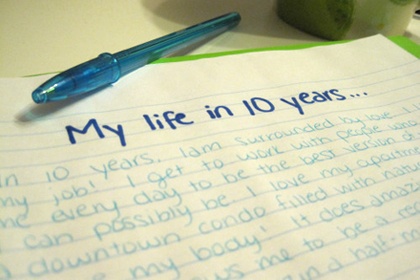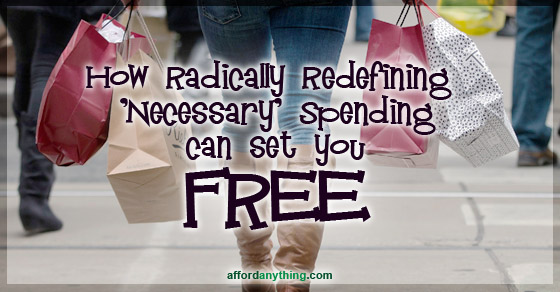 This has been a big week: I had dinner with my biological sister, whom I haven’t seen in 7 years. (I was adopted.)
This has been a big week: I had dinner with my biological sister, whom I haven’t seen in 7 years. (I was adopted.)
But this isn’t a blog post about cross-country family reunions. It’s a post about a magical thing called discretionary income, the key to a portal of incredible opportunities.
Discretionary money lets me visit my family in any corner of the globe without blinking an eye.
Wealth is measured by discretionary income, not raw income. A person who earns $8,000 per month but “needs” $8,001 to pay her self-imposed bills is in a worse financial position than the person who earns $2,500 but needs only $1,500.
Based on this Afford Anything definition of wealth, most people are poor, even those with six-figure salaries. Most people abuse credit cards and car loans and insane mortgages, trapping themselves in huge obligation loads and forcing their cost-of-living to spiral beyond control.
Then when an opportunity of a lifetime leaps in front of their eyes, they’re forced to quietly say no. They become their own jailers.
You don’t need a million dollars to be wealthy. You simply need to reduce your necessities so that you have gallons of discretionary money.
Amplifying Your Discretionary Income
Beyond a certain bare-minimum baseline of needed spending, everything else is discretionary. And you might be shocked to find how little money you truly “need.”
That baseline, I believe, is about $12,000 annually for a single person living in the U.S., or about $1,000 per month. That’s the least amount of money that a person can comfortably live on (though I’m sure there are stories of people living on less.)
During my college years, I lived on $1,000 per month, which consisted of:
$400 – Rent, including all utilities
$200 – Groceries
$100 – Health insurance
$50 – Basic cellular phone (NOT smartphone)
$250 – Miscellaneous everything else (toothpaste, sunblock, thrift-store clothes)
I didn’t own a car, home, or pets. I didn’t get fancy haircuts or drink lattes.
Did I want these things? Absolutely! I missed the company of pets. I wanted a better haircut. I wanted to live in a higher-cost-of-living area, like San Francisco (near my sister) or New York.
But I knew that these are discretionary choices, and I chose not to partake in them.
You can afford anything, but not everything. Every $1 is a trade-off.
Every $1 that I spent on gasoline or property taxes or an overpriced haircut would be $1 less that I could spend on my lifelong dream, world travel. After a few years of this lifestyle, I had saved enough to quit my 9-to-5 and jet around the globe.
Most people would say that owning a car, home, smartphone and new clothes are “necessities.” I believe they hold limiting beliefs.
You can increase your options in life by radically redefining “necessity.”
You Can Live on Less Than You Think
Do I maintain that ultra-bare-bones lifestyle today? Nope. These days I own a house, dine at sushi restaurants, get my hair highlighted, subscribe to Netflix, live with two cats and belong to a yoga studio.
I also recognize that these are choices, and I’m willing to accept those trade-offs.
Most people think of this as “normal” or, worse yet, conceptualize these expenses as “necessities.” But face the facts: this is ALL discretionary spending, every last dime of it.
Clothes? Discretionary. Cat food? Discretionary. Cell phone? Discretionary.
There’s nothing wrong with consciously choosing to spend your money in this manner (assuming you’re maxing out your retirement accounts and you have no consumer debt). But you MUST recognize it for what it is: luxurious discretionary spending, which comes at the cost of making trade-offs against other alternatives.
The vast majority of us spend most of our money on discretionary purchases. We just don’t realize that those purchases are discretionary. We’ve come to think of them as “normal.”
They’re not normal. They’re luxuries. Yes, everyone else is spending their money in that manner, but everyone else is broke.
To maximize your discretionary income, thereby living like you’re rich, reject the purchases that are “normal.” Shift your money towards the purchases that you truly want. Radically redefine “necessity.” You can live on less than you think.
